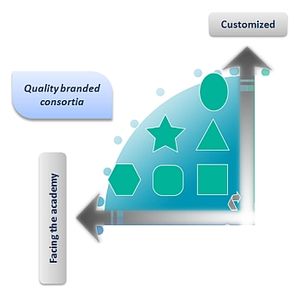DEANZ Case study
| Scenario planning for educators | |
|---|---|
| A manager's perspective of scenario planning | Introduction and objectives | Video signpost | DEANZ Case study | e-Learning Activity: Decision-making simulation | Conclusion | FAQs |
The purpose of this section is to explore scenarios from the perspective of an educational leader and decision-maker. In the case study below, Niki Davis reflects on her previous research work in developing scenarios and how this supports her role as a senior university leader. This case study will help you to prepare for the e-Learning activity where you will consider possible decisions in your context based on the reading of a scenario of your choice.
| Niki's scenario planning research project now supports decision-making in her role as senior academic leader
As a principal investigator for the New Zealand National Center for Tertiary Teaching Excellence (Ako Aotearoa), I led the creation of four scenarios for the future provision of tertiary education through a process of interviewing leaders in tertiary education, using the JISC scenario building strategies, and input from the education sector. The project was conducted in collaboration with the New Zealand Association for Open, Flexible and Distance Learning (DEANZ). Now as a senior leader of one of the Colleges of Education in New Zealand, I can better envisage a range of futures using this scenario set. The four DEANZ 2016 scenarios[1] were designed to fit between axes that identifed two major tensions today:
I keep the contrasts of these axes in mind to assist the brainstorm of the questions that inform planning for one or more scenarios. As this online workshop is offered in collaboration with the OERu, let us focus on the Quality Branded Consortia scenario because OERu is a philanthropic quality consortium that aims to open access to higher education for millions of students who cannot currently afford it. This is a synopsis of this 2016 scenario that is emerging for its currently 24-partner institutions:
This presents me and the university's senior management team with key decisions that include:
Reviewing this list we can see some that would apply to one of more of the other three scenarios in this set. |
Microblog activity
| Additional considerations?
Based on your reading of the Quality Branded Consortia scenario above, are there additional questions or considerations which you feel the University of Canterbury (UCan) as an OERu member should consider? Share your thoughts on additional questions arising from the Quality Branded Consortia scenario by posting on twitter or WEnotes. Remember to include the hashtag "#SP4Ed" in your post, for example:
|
References
- ↑ Davis, N., Higgins, A., & Zaka, P. 2012. 2016 scenario guide to effective tertiary education in New Zealand: Planning resource for senior managers. Wellington: Ako Aotearoa, National Centre for Tertiary Teaching Excellence.

